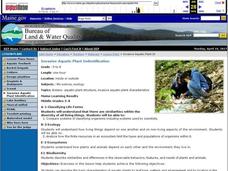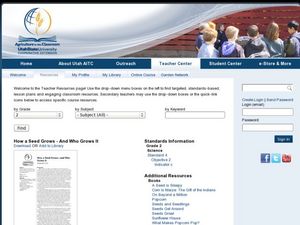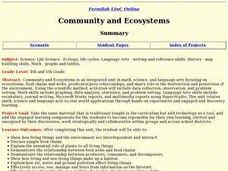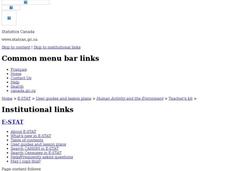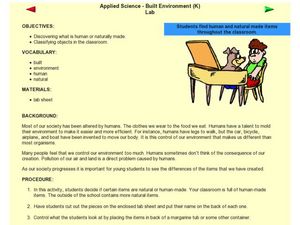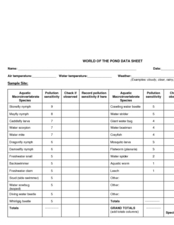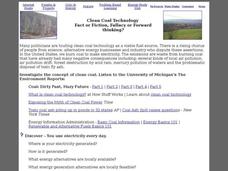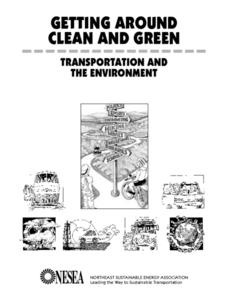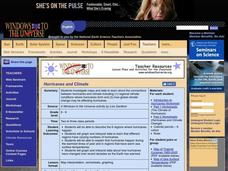Curated OER
How Germs Spread
Learners conduct a test to help them visualize the spread of
germs. They identify that a pandemic is an epidemic (an outbreak of an infectious disease) that spreads across a large region or even worldwide. Finally, students state...
Curated OER
Storm Watch: Knowing What To Do
Students study the different types of weather and how storms form. In this weather lesson students make their own "tornado in a bottle" and create brochures.
Curated OER
Invasive Aquatic Plant Identification
Students observe aquatic plants and animals and identify their systems. In this plants and animals lesson plan, students compare systems of organisms and orally express how plants and animals rely on each other.
Curated OER
Mighty Macroinvertebrates
Seventh graders identify the names and features of macroinvertebrates found in Turtle River. In this ecology instructional activity students use digital microscopes and take pictures of invertebrates.
Curated OER
Corrosion & Rust
Students examine how and when rust and corrosion occur. In this corrosion lesson students complete an experiment to see why metals rust.
Curated OER
Root, Root, Root for the Nutrients
Students observe the growth of a seed, predict what will happen when seeds are planted without soil, and conduct an experiment using a hydroponics system.
Curated OER
The Life Cycle of the Butterfly
Second graders study the life cycle of a butterfly by observing metamorphosis taking place in a butterfly pavilion. Students illustrate their understandings of the body parts of a caterpillar and butterfly, as well as the life cycle,...
Curated OER
How a Seed Grows and Who Grows It
First graders explore biology by viewing PowerPoint presentations in class. In this plant life lesson, 1st graders identify the life cycle of a plant and how to properly plant a seed outside. Students view a movie about plant life and...
Curated OER
Microorganism Multiplication
Sixth graders explore biology by viewing video clips in class. For this microorganism identification lesson, 6th graders identify the types of organisms that can feed small animals such as algae and protozoans. Students view video clips...
Curated OER
What Are Ecosystems?
Third graders recognize and examine ecosystems. They observe and describe habitats within ecosystems and observe and identify organisms with similar needs that compete for resources.
Curated OER
Community and Ecosystems
Students complete a unit of lessons on ecosystems. They participate in online activities, create a diorama, write journal entries, and develop a Hyperstudio multimedia project on a selected ecosystem.
Curated OER
Solid Waste in Canada
Students develop an understanding of waste and its effects. In this managing waste lesson students participate in one of a few activities including creating a poster, summarizing an article or writing a research paper.
Curated OER
Human or Natural?
Students explore nature by participating in a class lab activity. In this human vs. nature lesson, students examine a group of items in their classroom and discuss whether they were created naturally or have been altered or created by...
Curated OER
World of the Pond Data Sheet
In this pond worksheet, students study aspects associated with pond water and pond life. Students complete 26 fill in the blank questions to complete the data chart of observations.
Curated OER
Acid Rain Crossword Puzzle
In this acid rain crossword worksheet, students read 12 clues and select the answer from the word bank and place it in the crossword puzzle. Prior knowledge about acid rain is assumed.
Curated OER
Clean Coal Technology
In this clean coal activity, students click on the links to learn more about clean coal technology and answer short answer questions about it. Students complete 12 questions total.
Curated OER
Reduce, Reuse, Recycle
Fourth graders discover the differences between: reduce, reuse, and recycle by performing hands on examinations. They list what would happen to the soil if we allowed the earth to wash away and briefly discuss the meaning of erosion.
Curated OER
Getting Around Clean And Green
Middle schoolers investigate various aspects of transportation while working with different resources to conduct research. The research is used to find information in order to create a presentation that includes writing and graphing.
Curated OER
Everything's Connected
Students explore how trash decomposes. In this ecosystem lesson, students discuss new vocabulary words, such as producers and consumers, and think critically to answer how landfills work.
Curated OER
Dinosaurs 1: Where are the Dinosaurs?
Students study dinosaurs and explore the concept of extinction. In this dinosaur lesson students create dinosaur eggs and view dinosaur dioramas.
Curated OER
Hurricanes and Climate
Students investigate maps and data to learn about the connections between hurricanes and climate. In this exploratory lesson students describe and graph the 6 regions where hurricanes happen and discuss how hurricanes have changed over...
Curated OER
Sharks Taxonomy
Pupils, in groups, establish a classification system for the world of your classroom. They draw a chart to explain their categories and system to the rest of the class.
Curated OER
There Is No Away
Students identify how trash is disposed of. In this environmental lesson, students read and discuss the poem "Sarah Sylvia Stout" by Shel Silverstein and discuss the ways people treated the items in the poem. Students discuss how trash...
Curated OER
The Beaufort Scale: A Local Model
Students study the Beaufort Scale and use it to study wind in their community. In this wind study instructional activity, students watch a DVD about climate change and learn about the Beaufort Scale. Students complete a worksheet for the...




